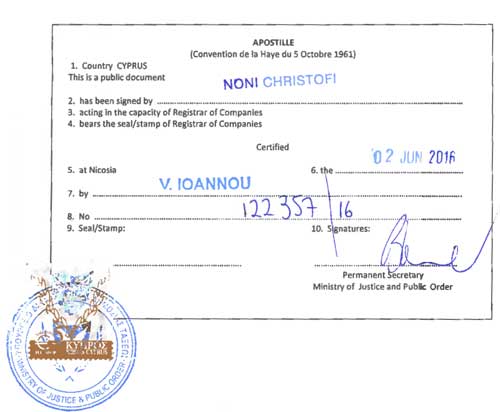
Schmidt & Schmidt компаниясы Кипр Республикасы аумағында берілген құжаттарды заңдастыру, яғни апостильдеу қызметтерін ұсынады.
Кипр 1961 жылғы 5 қазандағы Гаага конвенциясының қатысушысы болып табылады, бұл құжаттарды апостильдеу арқылы жеңілдетілген заңдастыру рәсімін қолдануға мүмкіндік береді. Кипр құжаттарды жеңілдетілген заңдастыру туралы Гаага конвенциясына 1972 жылғы 26 шілдеде қосылды, ал 1973 жылғы 30 сәуірде аталған конвенция күшіне енді.
Кипрде құжаттарды апостильмен куәландыруға уәкілетті орган — Әділет және қоғамдық тәртіп министрлігі.
Кипрде берілген, апостильмен куәландырылған және нотариус растаған аудармасы бар құжаттар Қазақстан аумағында заңды күшке ие болады.
Апостиль Кипрдің ресми мемлекеттік органдары берген және грек, түрік немесе ағылшын тілдерінде жасалған құжаттарға қойылуы мүмкін. Егер құжат басқа тілде рәсімделсе, ол Кипрдің ресми тілдерінің біріне сот аудармашысы жасаған аудармамен қоса ұсынылуы тиіс. Сондай-ақ, кипрлік нотариус куәландырған және құжатты берген мемлекеттік орган түпнұсқаға сәйкестігін растаған құжат көшірмелері де апостильденуі мүмкін.
Апостильмен жекеше құқықтық құжаттар да куәландырылуы мүмкін, соның ішінде шарттар, сенімхаттар, келісімдер, өсиеттер. Мұндай құжаттарға апостиль қою үшін алдымен құжаттағы қолтаңбалар нотариуспен куәландырылып, содан кейін нотариустың қолы мен мөрі апостильмен расталады.
Кипрде құжаттарды заңдастыру процесі құжаттың шығу тегін тексеруді және ондағы қолтаңба, мөр немесе штамп уәкілетті лауазымды тұлғалармен қойылғанын растауды қамтиды. Осы рәсімнен кейін құжатқа арнайы мөр — апостиль қойылады. Әдетте апостиль құжаттың артқы бетіне немесе жеке параққа қойылып, кейін құжат тігіледі.
Кипрдегі апостиль — қабырғасының өлшемі кемінде 9 сантиметр болатын, ағылшын тілінде рәсімделген төртбұрышты мөр. Онда «Apostille» деген міндетті тақырып және 1961 жылғы Гаага конвенциясына француз тіліндегі сілтеме (Convention de La Haye du 5 octobre 1961) көрсетіледі. Мөрдің мазмұны Гаага конвенциясымен белгіленген.

Кипрде апостильмен куәландырылуы мүмкін
- Кипр сауда тізілімінен алынған үзінділер
- Нотариус берген немесе куәландырған құжаттар
- Кипр соттары берген құжаттар: үкімдер және сот шешімдері
- Құжаттардың аудармалары
- Кипр мемлекеттік органдары берген ресми құжаттар
- Білім туралы құжаттар: аттестаттар, сертификаттар және дипломдар
- Сенімхаттар, өсиеттер, сыйға беру құжаттары
- Нотариус куәландырған құжат көшірмелері
- Мемлекеттік үлгідегі басқа құжаттар
Кедендік, дипломатиялық, консулдық құжаттар және төлқұжаттар апостильдеуге жатпайды.
Апостильдің қолданылу мерзімі шектелмейді, алайда құжаттардың өздерінің қолданылу мерзіміне шектеулер қойылуы мүмкін.
Апостиль мен консулдық заңдастыру арасындағы айырмашылықтар
Апостиль мен консулдық заңдастырудың ортақ белгісі – олар ресми құжаттың басқа елдің мекемелерінде қолданылуы үшін шынайылығын растайды. Алайда олардың арасында елеулі айырмашылықтар бар.
| Апостиль | Консулдық заңдастыру | |
|---|---|---|
| Шындық | Тек Гаага конвенциясына қатысушы елдер арасында ғана қолданылуы мүмкін. | Гаага конвенциясына қатыспайтын немесе қатысушы еместігінен бір немесе екі ел арасында, немесе бір тарап екінші тараптың қосылуына қарсы болған жағдайда қолданылады. |
| Алу қиындығы | Орташа. Апостиль алу үшін құжат берілген елдің уәкілетті органыға жүгіну қажет. | Жоғары. Консулдық заңдастыру үшін құжат берілген елдің әртүрлі органдарына және консулдықтарға жүгіну қажет |
| Алдын ала растау | Қажет емес. | Қажет. Құжатты берген органнан алдын ала растау қажет. |
| Мақсат елінің консулдығында заңдастыру | Мақсат елінің консулдығына жүгіну қажет емес. | Заңдастырудың соңғы кезеңі әдетте құжат берілген елде мақсат елінің консулдығында өтеді. |
Кипрде құжаттарды алу
Кейде азаматтық жағдай туралы құжаттар жоғалып кетеді немесе бүлінеді, немесе құжаттардың өзекті көшірмелерін алу қажет болады. Мұндай жағдайда құжаттардың дубликаттарын алу қажет. Көбінесе бұл рәсімде қиындыққа ұшырайтындар — Кипрден кеткен адамдар. Біздің сервис Кипрде құжаттарды қашықтықтан алуға мүмкіндік береді және біз құжатты бүкіл әлемнің кез келген нүктесіне курьер арқылы жеткізе аламыз.
Құжаттардың нотариалды аудармасы
Көбінесе мемлекеттік органдар тек мемлекеттік тілде жасалған құжаттарды қабылдайды. Сол себепті, апостильмен куәландырылған және шетел тілінде жасалған шетелдік құжаттарды қолдану үшін олардың аудармасын жасау және аударманы нотариалды куәландыру қажет. Бізде құжаттарды қазақ тіліне нотариалды аударуға тапсырыс беруге болады.
Аударма апостильмен куәландырылуы қажет пе?
Бір елде берілген және басқа елде қолдану үшін қажет кез келген шетелдік құжат заңдастырылуы тиіс. Ескерту: Кипрде жасалған, апостиль қойылған құжаттың орыс тіліне аудармасы әлі де шетелдік құжат болып саналады, сондықтан оған апостиль қою қажет болады. Сол себепті көптеген органдар Кипрден куәландырылған аудармаларды қабылдамауы мүмкін. Бұны болдырмау үшін аудармаларды құжатты қолданатын елде жасау ұсынылады.
























































